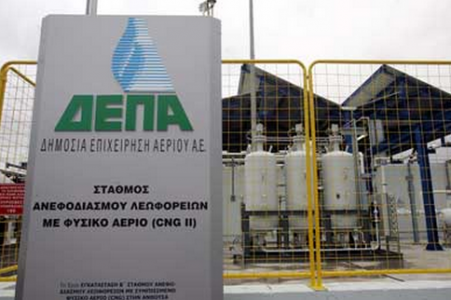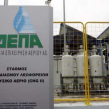
Gazprom Sets Stage for Takeover of Greek State Gas Company
Publication: Eurasia Daily Monitor Volume: 10 Issue: 104
By:

Insolvent Greece is auctioning off its state assets, both as a matter of necessity and as a condition imposed by international creditors for bailing out the country. The state-controlled natural gas company, DEPA/DESFA, is by far the most valuable asset in the Greek privatization package.
Russian natural gas giant Gazprom looks set to take over DEPA (Public Gas Corporation), Greece’s sole gas procurement and dominant distribution company. Meanwhile an obscure Russian company, Sintez, regarded as Gazprom’s proxy, competes against Azerbaijan’s State Oil Company (SOCAR) for acquisition of DESFA (Public Gas Transmission System Operator). These are the last remaining contenders from among the 17 bidders from 12 countries that had entered the contest in 2011. DESFA is the 100-percent-owned subsidiary of DEPA; but the two entities can, and are now being, sold separately.
The submission of binding offers from bidders did not take place on May 29, as had been scheduled. Two days before that deadline, it was rescheduled for June 10 to accommodate last-minute demands from Gazprom.
The Greek state owns 65 percent of DEPA, with the remaining 35 percent held by Hellenic Petroleum, itself 35-percent state owned. DEPA is a profitable business: it made a net profit of €106 million ($138 million) even in the unfavorable conditions prevailing during 2012. DEPA provides some 90 percent of the natural gas consumed in the country. Gazprom supplied more than 60 percent of the gas sold by DEPA in Greece in 2012. The 20-year sale and purchase contract is valid until 2016. Gazprom granted DEPA a price discount of 7 percent, effective since 2011—a type of concession that Gazprom has also granted to other European customers in an effort to maintain its market share (EurActiv, October 24, 2012; www.naturalgaseueurope, May 28). The price is said to be $475 per one thousand cubic meters in 2013 (Kommersant, May 28).
DEPA’s generally estimated market valuation is somewhat above €1 billion ($1.3 billion). Although the bids are supposedly confidential, Gazprom is known to have offered €900 million to €950 million ($1.17 billion–$1.23 billion) for taking over DEPA. The only remaining bidder in this contest is M&M Gas, an ad hoc consortium of the Greek companies Motor Oil and Mytilineos. M&M Gas is known to have offered €400 million to €550 million ($519 million–$713 million) for acquiring DEPA.
The Greek government is in no position to privilege the Greek bidder M&M Gas, even if such a policy choice were available to the government. The European Union and the International Monetary Fund insist that DEPA be sold to the highest bidder, even if this is Gazprom, so as to protect creditor banks’ interests, and mitigate Greek-generated risks to the euro currency.
In compliance with the bailout’s terms, Greece must raise €2.6 billion ($3.4 billion) from privatization auctions during 2013. Any shortfalls would have to be offset through fresh austerity measures, which neither the Greek government nor Western creditors would wish to enforce at the risk of fresh social turmoil. The combined proceeds of €1.5 billion ($1.95 billion), expected from selling DEPA and DESFA, would cover the lion’s share of the privatization revenue target for 2013.
The Greek government seems to be going out of its way with incentives to Gazprom to take over DEPA. On May 25 the government’s privatization agency, the Hellenic Republic Asset Development Fund (HRADF), which administers the bidding on the government’s behalf, announced that it has introduced fresh concessions into the eventual Sale and Purchase Agreement for DEPA (Kathimerini, May 27; EurActiv, May 22, 27):
• Greece guarantees to compensate the buyer with €180 million ($234 million), representing a portion of the €380 million ($494 million) owed to DEPA by its crisis-stricken Greek customers. With DEPA unable itself to collect those receivables, the Greek government hopes to collect them by December 2015 (i.e., two years after the sale of DEPA), but can hardly be certain of collecting. Most likely, it will end up paying those €180 million to Gazprom from Greek government funds, not from gas consumers’ unpaid bills.
• The cash deposit, accompanying the submission of a binding offer for DEPA (prior to adjudication), is being reduced from 20 to 10 percent of the price offer’s value. Moreover, the deposit shall not be forfeited, but returned in full, if the acquisition of DEPA is cancelled through no fault of the buyer. This provision anticipates possible action by European Union competition authorities against a vertically integrated monopoly arrangement, such as could result from Gazprom’s acquisition of DEPA.
• The buyer of DEPA shall be entitled to cancel the acquisition, in the event that Greece for whatever reason abandons the euro currency. Apparently, Gazprom is not interested in revenue that would be denominated in a Greek currency, should this hypothetically replace the euro in Greece. This provision is hardly a mark of Gazprom’s confidence in Greece’s economic stabilization.
Gazprom is not specifically mentioned by the Greek government or the privatization agency in granting these concessions. These are granted to the unnamed buyer of DEPA. But Gazprom is the clear frontrunner in the bidding, and the concessions look tailor-made for Gazprom. Its CEO, Alexei Miller, wrought them from the Greek government in the course of three visits to Athens between February and May. The government had notified the bidders in February that they had until April 12 to submit their binding offers. Instead, Miller descended on Athens (on May 22 for the third time) to change the terms in Gazprom’s favor (Kommersant, Kathimerini, February 11, 12; www.naturalgaseueurope, May 28).
For its part, the Greek government hopes for a second discount from Gazprom’s current sale price of $475 per one thousand cubic meters (see above).
This is an evolving story of Russian exploitation of Western policy failures. Greece had long misled Western banks and the European Union about the true state of that country’s finances. The banks, EU authorities, and key European governments seemed to close their eyes to that situation. When this imploded, it destabilized Greece’s social order, threatened the exposed Western banks with collapse, and jeopardized the euro currency. The EU and major governments, with Germany in the lead, rushed to stabilize the banks and the currency, while imposing long-overdue austerity measures on Greece, their tardiness inevitably exacerbating their severity.
As Greece must sell its national gas company, Russian Gazprom is ready with the cash and the tactics to win the bidding and impose its terms, over a host of European companies. The creditors demand that Greece sell to the highest bidder, even if this is Gazprom and irrespective of European energy security considerations. It even looks like a European anti-crisis measure made possible by a cash-rich Russia.




